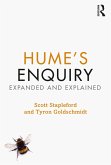

Alle Infos zum eBook verschenken

- Format: PDF
- Merkliste
- Auf die Merkliste
- Bewerten Bewerten
- Teilen
- Produkt teilen
- Produkterinnerung
- Produkterinnerung

Hier können Sie sich einloggen

Bitte loggen Sie sich zunächst in Ihr Kundenkonto ein oder registrieren Sie sich bei bücher.de, um das eBook-Abo tolino select nutzen zu können.
This anthology of readings in contemporary Western philosophy focuses on 19th-century philosophers who represent a variety of responses to the issue of their day: whether or not there was a knowable, nonhuman rational order upon which thinking persons could willfully choose to act. The selections are readable and accessible, yet remain faithful to the original works. Accompanying the text are drawings, diagrams, photographs, and a timeline; all of which allow the reader to really study the major philosophical thinkers of the 19th-century: Bentham, Wollstonecraft, Fichte, Hegel, Schopenhauer,…mehr
- Geräte: PC
- mit Kopierschutz
- eBook Hilfe
![Philosophic Classics, Volume IV (eBook, ePUB) Philosophic Classics, Volume IV (eBook, ePUB)]() Forrest BairdPhilosophic Classics, Volume IV (eBook, ePUB)113,95 €
Forrest BairdPhilosophic Classics, Volume IV (eBook, ePUB)113,95 €![Hume's Enquiry (eBook, PDF) Hume's Enquiry (eBook, PDF)]() David HumeHume's Enquiry (eBook, PDF)39,95 €
David HumeHume's Enquiry (eBook, PDF)39,95 €![A New Exploration of Hegel's Dialectics I (eBook, PDF) A New Exploration of Hegel's Dialectics I (eBook, PDF)]() Deng XiaomangA New Exploration of Hegel's Dialectics I (eBook, PDF)39,95 €
Deng XiaomangA New Exploration of Hegel's Dialectics I (eBook, PDF)39,95 €![Spinoza (eBook, PDF) Spinoza (eBook, PDF)]() Leon RothSpinoza (eBook, PDF)27,95 €
Leon RothSpinoza (eBook, PDF)27,95 €![Reason and Revolution (eBook, PDF) Reason and Revolution (eBook, PDF)]() Herbert MarcuseReason and Revolution (eBook, PDF)19,95 €
Herbert MarcuseReason and Revolution (eBook, PDF)19,95 €![Leibniz (eBook, PDF) Leibniz (eBook, PDF)]() Nicholas JolleyLeibniz (eBook, PDF)22,95 €
Nicholas JolleyLeibniz (eBook, PDF)22,95 €![Schelling, Freedom, and the Immanent Made Transcendent (eBook, PDF) Schelling, Freedom, and the Immanent Made Transcendent (eBook, PDF)]() Daniele FulviSchelling, Freedom, and the Immanent Made Transcendent (eBook, PDF)38,95 €
Daniele FulviSchelling, Freedom, and the Immanent Made Transcendent (eBook, PDF)38,95 €-
-
-
Dieser Download kann aus rechtlichen Gründen nur mit Rechnungsadresse in A, B, BG, CY, CZ, D, DK, EW, E, FIN, F, GR, HR, H, IRL, I, LT, L, LR, M, NL, PL, P, R, S, SLO, SK ausgeliefert werden.
- Produktdetails
- Verlag: Taylor & Francis eBooks
- Seitenzahl: 498
- Erscheinungstermin: 9. Juni 2023
- Englisch
- ISBN-13: 9781000945935
- Artikelnr.: 68157141
- Verlag: Taylor & Francis eBooks
- Seitenzahl: 498
- Erscheinungstermin: 9. Juni 2023
- Englisch
- ISBN-13: 9781000945935
- Artikelnr.: 68157141
- Herstellerkennzeichnung Die Herstellerinformationen sind derzeit nicht verfügbar.
Introduction to the Principles of Morals and Legislation (Chapters 1-4).
Mary Wollstonecraft.
A Vindication of the Rights of Woman (Chapter 6).
Johann Gottlieb Fichte.
On the Foundation of Our Belief in a Divine Government of the Universe. The
Vocation of Man (Book III).
G.W.F. Hegel.
Phenomenology of Spirit ("Independence and Dependence of
Self-Consciousness: Relations of Master and Servant"). Encyclopaedia
(Introduction). Who Thinks Abstractly? Reason in History: A General
Introduction to the Philosophy of History (Chapters 1-3). Lectures on the
History of Philosophy ("The Final Result").
Arthur Schopenhauer.
The World as Will and Idea (Chapter 19).
Auguste Comte.
Introduction to Positive Philosophy ("The Nature and Importance of the
Positive Philosophy").
Ludwig Feuerbach.
The Essence of Christianity (Chapter 1).
John Stuart Mill.
Utilitarianism. On Liberty. The Subjection of Women (Selections from
Chapter 1).
Søren Kierkegaard.
Fear and Trembling ("Is There a Teleological Suspension of the Ethical?").
Concluding Unscientific Postscript (Section I, Chapter 2; Section II,
Chapter 2). The Present Age (in part).
Karl Marx.
Economic and Philosophic Manuscripts of 1844 ("Alienated Labor," "Private
and Communism Property," and "Critique of Hegelian Dialectic and Philosophy
in General"). Manifesto of the Communist Party (Chapters 1, 4). The German
Ideology ("Ideology in General, German Ideology in Particular"). A
Contribution to the Critique of Political Economy (Author's Preface and
Introduction).
Charles Sanders Peirce.
The Fixation of Belief. How to Make Our Ideas Clear.
William James.
The Will to Believe. Pragmatism (Lectures, I, II, IV, VI).
Friedrich Nietzsche.
The Birth of Tragedy (Chapters I-III, XV, XXV). The Genealogy of Morality
("Good and Evil," "Good and Bad"). Thus Spoke Zarathustra (Part I, Chapters
1-3). Twilight of the Idols (Selections). The Will to Power (§1067). The
Anti-Christ (First Book, Chapters 2-7, 62).
Introduction to the Principles of Morals and Legislation (Chapters 1-4).
Mary Wollstonecraft.
A Vindication of the Rights of Woman (Chapter 6).
Johann Gottlieb Fichte.
On the Foundation of Our Belief in a Divine Government of the Universe. The Vocation of Man (Book III).
G.W.F. Hegel.
Phenomenology of Spirit ("Independence and Dependence of Self-Consciousness: Relations of Master and Servant"). Encyclopaedia (Introduction). Who Thinks Abstractly? Reason in History: A General Introduction to the Philosophy of History (Chapters 1-3). Lectures on the History of Philosophy ("The Final Result").
Arthur Schopenhauer.
The World as Will and Idea (Chapter 19).
Auguste Comte.
Introduction to Positive Philosophy ("The Nature and Importance of the Positive Philosophy").
Ludwig Feuerbach.
The Essence of Christianity (Chapter 1).
John Stuart Mill.
Utilitarianism. On Liberty. The Subjection of Women (Selections from Chapter 1).
Søren Kierkegaard.
Fear and Trembling ("Is There a Teleological Suspension of the Ethical?"). Concluding Unscientific Postscript (Section I, Chapter 2; Section II, Chapter 2). The Present Age (in part).
Karl Marx.
Economic and Philosophic Manuscripts of 1844 ("Alienated Labor," "Private and Communism Property," and "Critique of Hegelian Dialectic and Philosophy in General"). Manifesto of the Communist Party (Chapters 1, 4). The German Ideology ("Ideology in General, German Ideology in Particular"). A Contribution to the Critique of Political Economy (Author's Preface and Introduction).
Charles Sanders Peirce.
The Fixation of Belief. How to Make Our Ideas Clear.
William James.
The Will to Believe. Pragmatism (Lectures, I, II, IV, VI).
Friedrich Nietzsche.
The Birth of Tragedy (Chapters I-III, XV, XXV). The Genealogy of Morality ("Good and Evil," "Good and Bad"). Thus Spoke Zarathustra (Part I, Chapters 1-3). Twilight of the Idols (Selections). The Will to Power ( 1067). The Anti-Christ (First Book, Chapters 2-7, 62).
Introduction to the Principles of Morals and Legislation (Chapters 1-4).
Mary Wollstonecraft.
A Vindication of the Rights of Woman (Chapter 6).
Johann Gottlieb Fichte.
On the Foundation of Our Belief in a Divine Government of the Universe. The
Vocation of Man (Book III).
G.W.F. Hegel.
Phenomenology of Spirit ("Independence and Dependence of
Self-Consciousness: Relations of Master and Servant"). Encyclopaedia
(Introduction). Who Thinks Abstractly? Reason in History: A General
Introduction to the Philosophy of History (Chapters 1-3). Lectures on the
History of Philosophy ("The Final Result").
Arthur Schopenhauer.
The World as Will and Idea (Chapter 19).
Auguste Comte.
Introduction to Positive Philosophy ("The Nature and Importance of the
Positive Philosophy").
Ludwig Feuerbach.
The Essence of Christianity (Chapter 1).
John Stuart Mill.
Utilitarianism. On Liberty. The Subjection of Women (Selections from
Chapter 1).
Søren Kierkegaard.
Fear and Trembling ("Is There a Teleological Suspension of the Ethical?").
Concluding Unscientific Postscript (Section I, Chapter 2; Section II,
Chapter 2). The Present Age (in part).
Karl Marx.
Economic and Philosophic Manuscripts of 1844 ("Alienated Labor," "Private
and Communism Property," and "Critique of Hegelian Dialectic and Philosophy
in General"). Manifesto of the Communist Party (Chapters 1, 4). The German
Ideology ("Ideology in General, German Ideology in Particular"). A
Contribution to the Critique of Political Economy (Author's Preface and
Introduction).
Charles Sanders Peirce.
The Fixation of Belief. How to Make Our Ideas Clear.
William James.
The Will to Believe. Pragmatism (Lectures, I, II, IV, VI).
Friedrich Nietzsche.
The Birth of Tragedy (Chapters I-III, XV, XXV). The Genealogy of Morality
("Good and Evil," "Good and Bad"). Thus Spoke Zarathustra (Part I, Chapters
1-3). Twilight of the Idols (Selections). The Will to Power (§1067). The
Anti-Christ (First Book, Chapters 2-7, 62).
Introduction to the Principles of Morals and Legislation (Chapters 1-4).
Mary Wollstonecraft.
A Vindication of the Rights of Woman (Chapter 6).
Johann Gottlieb Fichte.
On the Foundation of Our Belief in a Divine Government of the Universe. The Vocation of Man (Book III).
G.W.F. Hegel.
Phenomenology of Spirit ("Independence and Dependence of Self-Consciousness: Relations of Master and Servant"). Encyclopaedia (Introduction). Who Thinks Abstractly? Reason in History: A General Introduction to the Philosophy of History (Chapters 1-3). Lectures on the History of Philosophy ("The Final Result").
Arthur Schopenhauer.
The World as Will and Idea (Chapter 19).
Auguste Comte.
Introduction to Positive Philosophy ("The Nature and Importance of the Positive Philosophy").
Ludwig Feuerbach.
The Essence of Christianity (Chapter 1).
John Stuart Mill.
Utilitarianism. On Liberty. The Subjection of Women (Selections from Chapter 1).
Søren Kierkegaard.
Fear and Trembling ("Is There a Teleological Suspension of the Ethical?"). Concluding Unscientific Postscript (Section I, Chapter 2; Section II, Chapter 2). The Present Age (in part).
Karl Marx.
Economic and Philosophic Manuscripts of 1844 ("Alienated Labor," "Private and Communism Property," and "Critique of Hegelian Dialectic and Philosophy in General"). Manifesto of the Communist Party (Chapters 1, 4). The German Ideology ("Ideology in General, German Ideology in Particular"). A Contribution to the Critique of Political Economy (Author's Preface and Introduction).
Charles Sanders Peirce.
The Fixation of Belief. How to Make Our Ideas Clear.
William James.
The Will to Believe. Pragmatism (Lectures, I, II, IV, VI).
Friedrich Nietzsche.
The Birth of Tragedy (Chapters I-III, XV, XXV). The Genealogy of Morality ("Good and Evil," "Good and Bad"). Thus Spoke Zarathustra (Part I, Chapters 1-3). Twilight of the Idols (Selections). The Will to Power ( 1067). The Anti-Christ (First Book, Chapters 2-7, 62).







